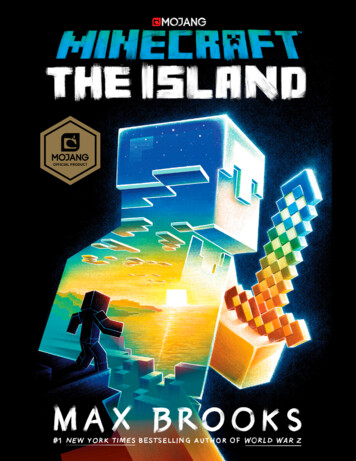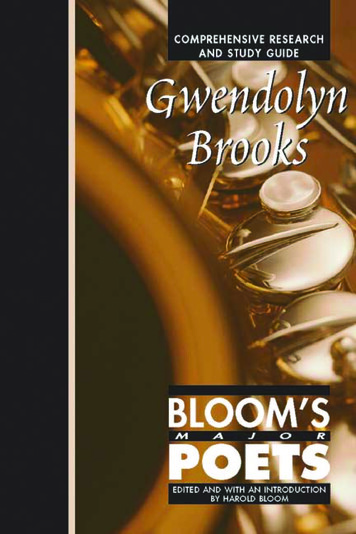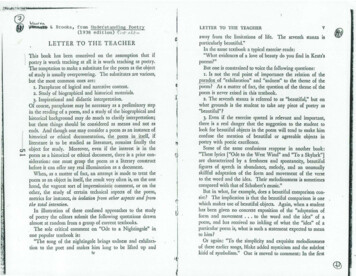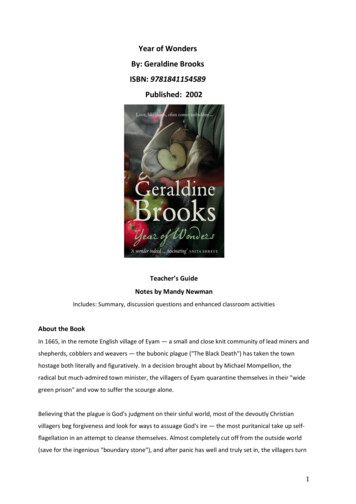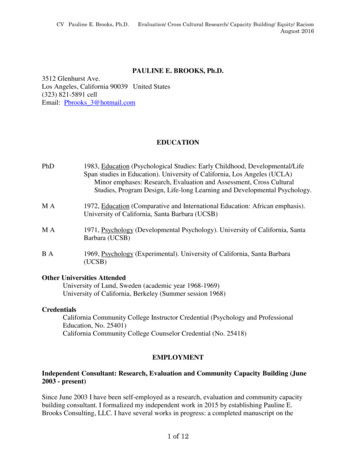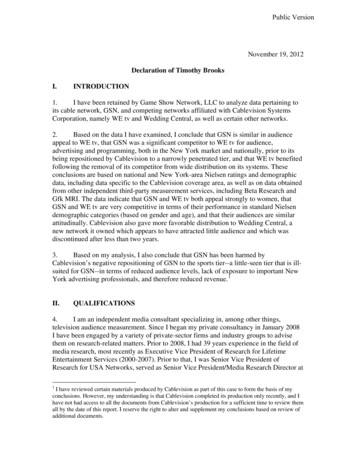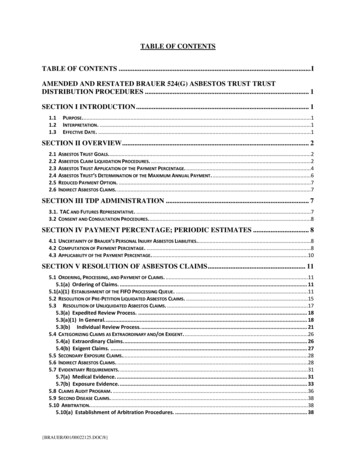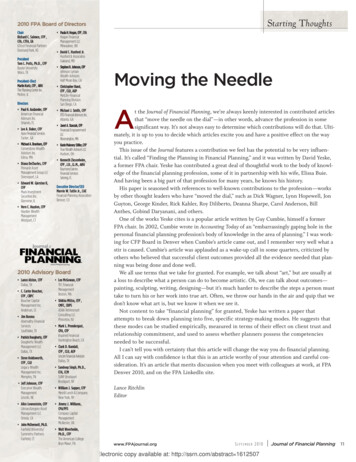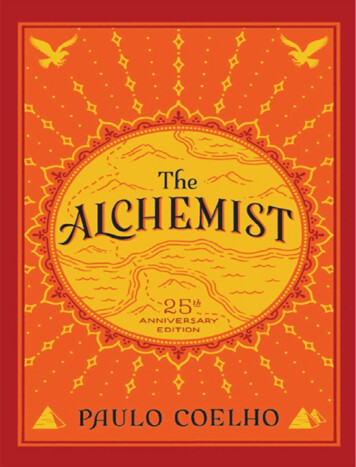
Transcription
ContentsInternational Acclaim forPaulo Coelho’sForewordProloguePart OnePart TwoEpilogueA Preview of Paulo Coelho’s:Warrior of the Light
Warrior of the Light:PrologueAbout the AuthorAlso by Paulo CoelhoBack AdsCopyrightAbout the Publisher
International Acclaimfor Paulo Coelho’sTHE ALCHEMIST“The story has the comiccharm, dramatic tension, andpsychological intensity of afairy tale, but it’s full ofspecific wisdom as well. . . .A sweetly exotic tale for
young and old alike.”—Publishers Weekly“Beneath this novel’scompelling story and theshimmering elegance withwhich it’s told lies a bedrockof wisdom about followingone’s heart.”—Booklist“As memorable and
meaningful as SaintExupéry’s The Little Prince.”—Austin AmericanStatesman“A touching, inspiring fable.”—Indianapolis Star“A little poke in the ribs fromon high.”—Detroit Free Press
“The Alchemist is a fabuloussuccess.”—Der Spiegel (Germany)“A remarkable tale about themost magical of all journeys:the quest to fulfill one’sdestiny. I recommend TheAlchemist to anyone who ispassionately committed toclaiming the life of theirdreams—today.”
—Anthony Robbins, authorof Awaken the Giant Within“An entrepreneurial tale ofuniversal wisdom we canapply to the business of ourown lives.”—Spencer Johnson, M.D.,author of Who Moved MyCheese“An adventure story full of
magic and wisdom.”—Rudolfo Anaya, author ofBless Me, Ultima“The Alchemist is a beautifulbook about magic, dreams,and the treasures we seekelsewhere and then find at ourdoorstep.”—Madonna in SonntagAktuell (Germany)
“The Alchemist is anunabashed delight andinspirational wonder. Thisfable is a roseate amalgam ofspiritual quest, existentialpuzzle, lovely sensitivity, anddeep strength.”—Malcolm Boyd, author ofAre You Running with Me,Jesus?“Paulo Coelho knows the
secret of literary alchemy.”—Kenzaburo Oé, winner ofthe Nobel Prize in Literature“A most tender and gentlestory. It is a rare gem of abook, and will most certainlytouch the very core of everyheart earnestly seeking itsown destiny on the journey oflife.”—Gerald G. Jampolsky,
M.D., coauthor of ChangeYour Mind, Change Your Lifeand Love Is Letting Go ofFear“Rarely do I come across astory with the directness andsimplicity of Coelho’s TheAlchemist. It lifts the readerout of time and focusesthrough a believably unlikelystory on a young dreamerlooking for himself. A
beautiful story with a pointedmessage for every reader.”—Joseph Girzone, author ofJoshua“This is the type of book thatmakes you understand moreabout yourself and about life.It has philosophy and isspiced with colors, flavors,and subjects, like a fairy tale.A lovely book.”
—Yedi’ot Aharonot (Israel)“A boy named Santiago joinsthe ranks of Candide andPinocchio by taking us on avery excellent adventure.”—Paul Zindel, author of thePulitzer Prize–winning playThe Effect of Gamma Rays onMan-in-the-Moon Marigolds“The mystic quality in the
odd adventures of the boy,Santiago, may bring not onlyhim but others who read thisfine book closer torecognizing and reachingtheir own inner destinies.”—Charlotte Zolotow, authorof If You Listen“Paulo Coelho gives you theinspiration to follow yourown dreams by seeing the
world through your own eyesand not someone else’s.”—Lynn Andrews, author ofthe Medicine Woman series“Nothing is impossible, suchis Coelho’s message, as longas you wish it with all yourheart. No other book bears somuch hope; small wonder itsauthor became a guru amongall those in search of the
meaning of life.”—Focus (Germany)“The Alchemist is a trulypoetic book.”—Welt am Sonntag(Germany)“Dotted throughout the storyand illuminated in a poeticstyle are metaphors and deepinsights that stir our
imagination and transport thereader on a fantastic journeyof the soul.”—Yomiuri Shimbun (Japan)“The Alchemist brings tomind The Little Prince bySaint-Exupéry and TheProphet by Khalil Gibran, aswell as biblical parables.”—Gazeta Wyborcza (Poland)
“The Alchemist is a beautifuland heartwarming story withan exotic flavor. . . . You mayor may not agree with PauloCoelho’s philosophy, but it’snonetheless a tale thatcomforts our hearts as muchas our souls.”—Bergensavisen (Norway)“The Alchemist is like amodern-day The Little
Prince. A supreme andsimple book.”—Milorad Pavic, author ofDictionary of the Khazars“Among Latin Americanwriters, only Colombia’sGabriel Garcia Marquez ismore widely read thanBrazil’s Paulo Coelho.”—The Economist
ForewordWhen The Alchemist was firstpublished twenty-five yearsago in my native Brazil, noone noticed. A bookseller inthe northeast corner of thecountry told me that only oneperson purchased a copy thefirst week of its release. Ittook another six months forthe bookseller to unload a
second copy—and that was tothe same person who boughtthe first! And who knowshow long it took to sell thethird.By the end of the year, itwas clear to everyone r decided to cut meloose and cancelled ourcontract. They wiped theirhands of the project and let
me take the book with me. Iwas forty-one and desperate.But I never lost faith inthe book or ever wavered inmy vision. Why? Because itwas me in there, all of me,heart and soul. I was livingmy own metaphor. A mansets out on a journey,dreaming of a beautiful ormagical place, in pursuit ofsome unknown treasure. Atthe end of his journey, the
man realizes the treasure waswith him the entire time. Iwas following my PersonalLegend, and my treasure wasmy capacity to write. And Iwanted to share this treasurewith the world.As I wrote in TheAlchemist, when you wantsomething,thewholeuniverse conspires to helpyou. I started knocking on thedoors of other publishers.
Oneopened,andthepublisher on the other sidebelieved in me and my bookand agreed to give TheAlchemist a second chance.Slowly, through word ofmouth, it finally started to sell—three thousand, then sixthousand, ten thousand—book by book, graduallythroughout the year.Eight months later, anAmerican visiting Brazil
picked up a copy of TheAlchemistinalocalbookstore. He wanted totranslate the book and helpme find a publisher in theUnited States. HarperCollinsagreed to bring it to anAmericanaudience,publishing it with greatfanfare: ads in the New YorkTimes and influential newsmagazines,radioandtelevision interviews. But it
still took some time to sell,slowly finding its audience inthe United States by word ofmouth, just as it did in Brazil.And then one day, BillClinton was photographedleaving the White House witha copy. Then Madonna ravedabout the book to VanityFair, and people fromdifferent walks of life—fromRush Limbaugh and WillSmith to college students and
soccer moms—were suddenlytalking about it.The Alchemist became aspontaneous—and organic—Phenomenon. The book hitthe New York Times bestsellerlist, an important milestonefor any author, and stayedthere for more than threehundred weeks. It has sincebeen translated into morethaneightydifferentlanguages, the most translated
book by any living author,and is widely considered oneof the ten best books of thetwentieth century.People continue to ask meif I knew The Alchemistwould be such a hugesuccess. The answer is no. Ihad no idea. How could I?When I sat down to write TheAlchemist, all I knew is that Iwanted to write about mysoul. I wanted to write about
my quest to find my treasure.I wanted to follow the omens,because I knew even then thatthe omens are the language ofGod.Though The Alchemist isnow celebrating its twentyfifth anniversary, it is no relicof the past. The book is stillvery much alive. Like myheart and like my soul, itcontinues to live every day,because my heart and soul are
in it. And my heart and soulis your heart and soul. I amSantiago the shepherd boy insearch of my treasure, just asyou are Santiago the shepherdboy in search of your own.The story of one person is thestory of everyone, and oneman’s quest is the quest of allof humanity, which is why IbelieveTheAlchemistcontinues all these years laterto resonate with people from
different cultures all aroundthe world, touching thememotionally and spiritually,equally, without prejudice.I re-read The Alchemistregularly and every time I doI experience the samesensations I felt when I wroteit. And here is what I feel. Ifeel happiness, because it isall of me, and all of yousimultaneously.Ifeelhappiness, too, because I
know I can never be alone.Wherever I go, peopleunderstandme.Theyunderstand my soul. Thiscontinues to give me hope.When I read about clashesaround the world—politicalclashes, economic clashes,culturalclashes—Iamreminded that it is within ourpower to build a bridge to becrossed. Even if my neighbordoesn’tunderstandmy
religion or understand mypolitics, he can understandmy story. If he canunderstand my story, thenhe’s never too far from me. Itis always within my power tobuild a bridge. There isalwaysachanceforreconciliation, a chance thatone day he and I will sitaround a table together andput an end to our history ofclashes. And on this day, he
will tell me his story and Iwill tell him mine.— Paulo Coelho, 2014
PrologueTranslated by CliffordE. LandersThe alchemist picked up abook that someone in thecaravan had brought. Leafingthrough the pages, he found astory about Narcissus.
The alchemist knew thelegend of Narcissus, a youthwho knelt daily beside a laketo contemplate his ownbeauty. He was so fascinatedby himself that, one morning,he fell into the lake anddrowned. At the spot wherehe fell, a flower was born,which was called thenarcissus.But this was not how theauthor of the book ended the
story.He said that whenNarcissus died, the goddessesof the forest appeared andfound the lake, which hadbeen fresh water, transformedinto a lake of salty tears.“Why do you weep?” thegoddesses asked.“I weep for Narcissus,”the lake replied.“Ah, it is no surprise thatyou weep for Narcissus,” they
said, “for though we alwayspursued him in the forest, youalone could contemplate hisbeauty close at hand.”“But . . . was Narcissusbeautiful?” the lake asked.“Who better than you toknow that?” the goddessessaid in wonder. “After all, itwas by your banks that heknelt each day to contemplatehimself!”The lake was silent for
some time. Finally, it said:“I weep for Narcissus, butI never noticed that Narcissuswas beautiful. I weepbecause, each time he kneltbeside my banks, I could see,in the depths of his eyes, myown beauty reflected.”“What a lovely story,” thealchemist thought.
THEBOY’SNAMEWASwas falling asthe boy arrived with his herdat an abandoned church. Theroof had fallen in long ago,and an enormous sycamorehad grown on the spot wherethe sacristy had once stood.He decided to spend thenight there. He saw to it thatall the sheep entered throughthe ruined gate, and then laidSANTIAGO. DUSK
some planks across it toprevent the flock fromwandering away during thenight. There were no wolvesin the region, but once ananimal had strayed during thenight, and the boy had had tospend the entire next daysearching for it.He swept the floor withhis jacket and lay down,using the book he had justfinished reading as a pillow.
He told himself that he wouldhave to start reading thickerbooks: they lasted longer, andmademorecomfortablepillows.It was still dark when heawoke, and, looking up, hecould see the stars throughthe half-destroyed roof.I wanted to sleep a littlelonger, he thought. He hadhad the same dream that nightas a week ago, and once again
he had awakened before itended.He arose and, taking uphis crook, began to awakenthe sheep that still slept. Hehad noticed that, as soon ashe awoke, most of hisanimals also began to stir. Itwas as if some mysteriousenergy bound his life to thatof the sheep, with whom hehad spent the past two years,leading them through the
countryside in search of foodand water. “They are so usedto me that they know myschedule,”hemuttered.Thinking about that for amoment, he realized that itcould be the other wayaround: that it was he whohad become accustomed totheir schedule.But there were certain ofthem who took a bit longer toawaken. The boy prodded
them, one by one, with hiscrook, calling each by name.He had always believed thatthe sheep were able tounderstand what he said. Sothere were times when heread them parts of his booksthat had made an impressionon him, or when he would tellthem of the loneliness or thehappiness of a shepherd in thefields. Sometimes he wouldcomment to them on the
things he had seen in thevillages they passed.But for the past few dayshe had spoken to them aboutonly one thing: the girl, thedaughter of a merchant wholived in the village theywould reach in about fourdays. He had been to thevillage only once, the yearbefore. The merchant was theproprietor of a dry goodsshop,andhealways
demanded that the sheep besheared in his presence, sothat he would not be cheated.A friend had told the boyabout the shop, and he hadtaken his sheep there.“I need to sell some wool,”the boy told the merchant.The shop was busy, andthe man asked the shepherd to
wait until the afternoon. Sothe boy sat on the steps of theshop and took a book fromhis bag.“I didn’t know shepherdsknew how to read,” said agirl’s voice behind him.The girl was typical of theregion of Andalusia, withflowing black hair, and eyesthat vaguely recalled theMoorish conquerors.
“Well, usually I learnmore from my sheep thanfrom books,” he answered.During the two hours thatthey talked, she told him shewas the merchant’s daughter,and spoke of life in thevillage, where each day waslike all the others. Theshepherd told her of theAndalusian countryside, andrelated the news from theother towns where he had
stopped. It was a pleasantchange from talking to hissheep.“How did you learn toread?” the girl asked at onepoint.“Like everybody learns,”he said. “In school.”“Well, if you know howto read, why are you just ashepherd
THE ALCHEMIST “The story has the comic charm, dramatic tension, and psychological intensity of a fairy tale, but it’s full of specific wisdom as well. . . . A
